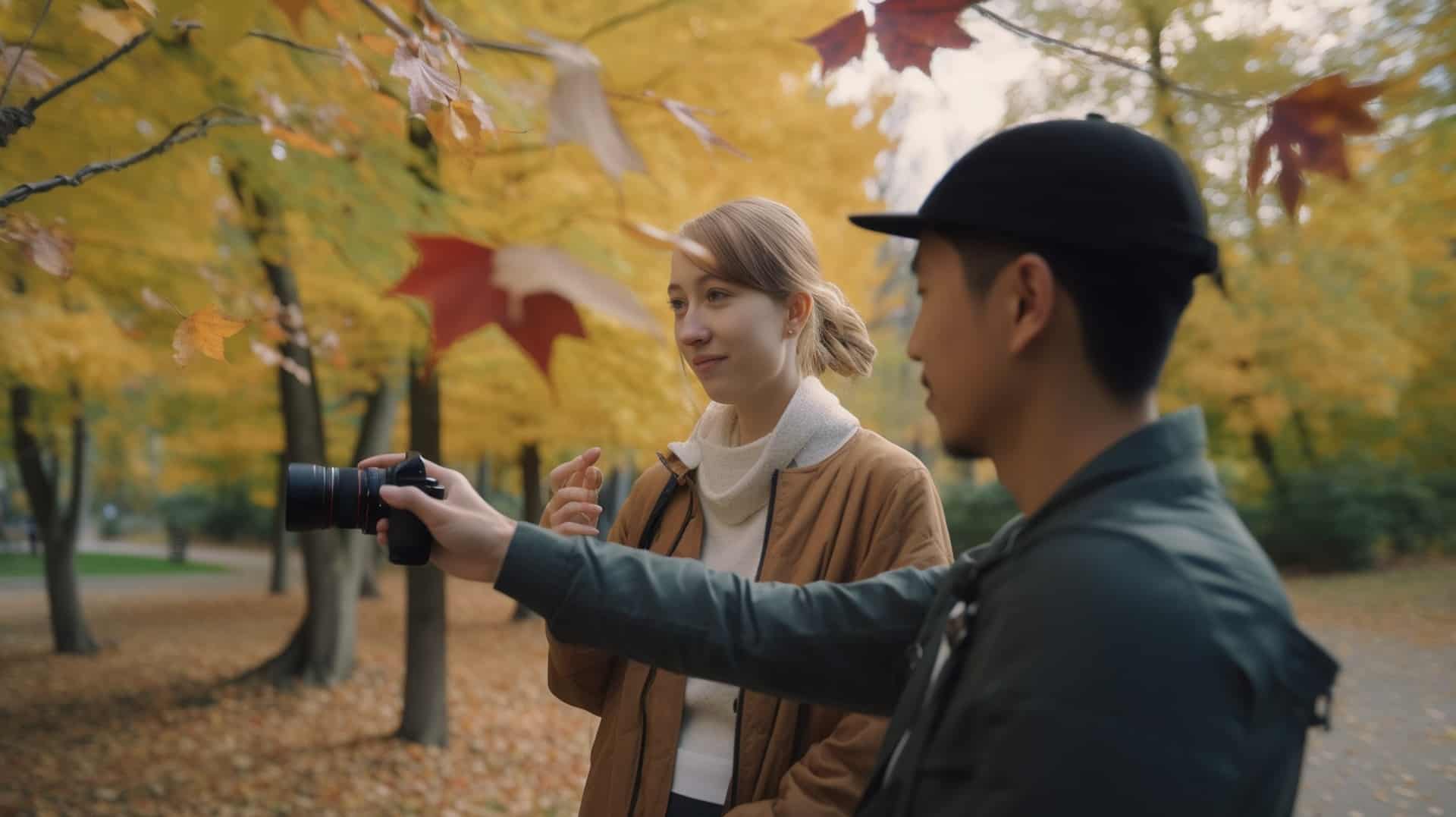Navigating the dating world can be a daunting journey for anyone, but when you’re on the autism spectrum, it may feel even more challenging. This guide aims to empower autistic individuals in their quest for love and connection by providing practical advice and proven strategies to forge meaningful relationships with women.
So, buckle up as we dive into understanding autism’s impact on dating and unveil techniques that will help you confidently embrace your uniqueness while fostering fruitful connections with potential partners. Join us on this enlightening journey toward finding the perfect match for your heart!
Table of Contents
Understanding Autism And Its Impact On Dating
Autistic individuals face social challenges when it comes to dating, but being on the autism spectrum also offers unique benefits in relationships.
Social Challenges Faced By Autistic Individuals
Social challenges are a common experience for autistic individuals, which can make forming relationships and dating more complex. One issue that many people on the autism spectrum face is difficulty with social cues and nonverbal communication. This can include trouble understanding facial expressions, body language, or making eye contact. For example, an autistic person may not notice when someone is losing interest in a conversation, leading to potentially awkward interactions in social settings.

Another challenge faced by some autistic individuals is sensory overload. Crowded or noisy environments like parties or nightclubs can be overwhelming and lead to increased anxiety levels. Adjusting to different social situations may require extra effort for those on the spectrum compared to their neurotypical counterparts. An example could be an autistic man attending his first mixer event at work; he might find it challenging to engage with others due to background noise and bright lighting but perseveres by finding quieter spaces where he feels more comfortable striking up conversations about shared interests with potential partners. By recognizing these unique obstacles, single men on the autism spectrum can develop strategies for overcoming them and connecting effectively with women in both casual and romantic contexts.
Benefits Of Being On The Autism Spectrum In Relationships
While dating and forming relationships may pose certain challenges for individuals on the autism spectrum, there are also unique benefits that can contribute to a healthy and fulfilling partnership. One such advantage is their candid and honest communication style. Autistic individuals often prioritize clarity and directness in conversation, which can foster trust and openness between partners. For example, when discussing relationship expectations or addressing potential conflicts, autistic people may be more upfront with their feelings than their neurotypical counterparts.
Another benefit of being on the autism spectrum in a relationship is having a strong dedication to special interests or hobbies. This passion not only allows for meaningful shared experiences but also provides opportunities to bond over mutual interests. A couple might discover common ground through their enthusiasm for topics like art, technology, history, or nature – activities where they can genuinely enjoy each other’s company while simultaneously engaging in intellectual growth together.
Furthermore, the loyalty shown by many autistic individuals towards their loved ones can be an essential component of long-lasting relationships. Their unwavering commitment to those they care about fosters stability within partnerships while offering emotional security to both parties involved. In navigating life’s obstacles as any couple would do so, it becomes evident that embracing one another’s strengths—while understanding limitations—is crucial in creating lasting connections based on mutual respect and support.
The Importance Of Self-awareness And Acceptance

Self-awareness and acceptance are crucial when it comes to dating as an autistic individual. By embracing your unique qualities and developing confidence and self-esteem, you can build meaningful connections with others. Learn more about how to connect with women on the autism spectrum by reading further.
Embracing Your Unique Qualities
It’s important to recognize and embrace the unique qualities that make you who you are. As someone on the autism spectrum, these can include a deep interest in a particular hobby or activity, a keen attention to detail, or an ability to think outside of the box. Embracing your unique qualities not only helps build your confidence and self-esteem but also allows you to showcase what makes you special to potential partners.
For example, if your special interest is video games and you meet someone who shares that passion, it can create an instant connection and bond between the two of you. Similarly, if you have an exceptional talent for drawing or painting, sharing those skills with someone can be both impressive and captivating. By embracing these qualities instead of hiding them away in fear of being different or weird, you increase your chances of finding someone who appreciates and values those traits.
Remember that everyone has something special about them- it’s what makes us human. So don’t be afraid to show off what sets you apart from others!
Developing Confidence And Self-esteem
Developing confidence and self-esteem is an important part of connecting with women when you’re autistic. It’s essential to recognize your unique qualities and embrace them as strengths. Don’t let your autism hold you back from expressing yourself or pursuing your interests.
One way to build confidence is by finding like-minded individuals who share your hobbies and passions. Joining social groups or clubs can provide a sense of belonging and help you develop meaningful connections with others. Additionally, practicing communication skills such as active listening, understanding nonverbal cues, and using online dating platforms can also boost self-esteem in social situations. I was lucky enough to find a girlfriend that is also autistic, but that isn’t always the case.
Remember that everyone has their own preferences and needs in a relationship. It’s crucial to set boundaries, manage sensory overload, and communicate openly with partners about what works for you. Coping with rejection can be tough, but learning how to cope healthily will help build resilience over time. Seeking support from friends, family, or professionals is always an option too!
Building A Strong Social Network
Finding like-minded individuals is crucial for building a strong social network when you’re autistic, and joining social groups and clubs or trying online dating can be effective ways to connect with others who share your interests.
Finding Like-minded Individuals
As a single man on the autism spectrum, it can be challenging to find someone who shares your interests and understands you. Here are some tips for finding like-minded individuals:
- Join online communities: Look for online forums or social media groups related to your hobbies and interests. This is a great way to connect with people who share your passions and may lead to potential romantic connections.
- Attend events and clubs: Check out local events in your community, such as hobby clubs or social gatherings. This can be an opportunity to meet new people with similar interests, expand your social circle, and potentially meet a romantic partner.
- Seek out autism-specific groups: Look for support groups or organizations that focus on autism advocacy or offer resources for individuals on the spectrum. These groups often host events and provide opportunities to connect with other autistic individuals.
Remember, finding like-minded individuals takes time and effort. Don’t be discouraged if you don’t meet someone right away. Be patient, keep putting yourself out there, and eventually, you will find someone who appreciates you for who you are.
Joining Social Groups And Clubs
Joining social groups and clubs can be an excellent way for autistic individuals to build a strong social network and increase their chances of finding a girlfriend. Here are some ideas for finding and joining the right groups:
- Look online: Many autism-specific organizations offer a variety of social and support groups geared toward adults on the spectrum. Check out organizations like the Autism Society or Asperger/Autism Network to get started.
- Focus on your interests: Choosing groups that focus on shared interests or hobbies can make it easier to connect with like-minded individuals. Consider joining a book club, gaming group, or sports team.
- Attend local events: Check your local community calendar for events that interest you, such as concerts or festivals. Attending these events can help you meet new people who share similar interests.
- Be open-minded: Don’t limit yourself to only attending autism-specific events or groups. Joining broader social clubs or volunteer organizations can also help expand your social circle.
- Take advantage of online resources: Social media platforms like Facebook have many interest-based groups and pages that you can participate in from the comfort of your own home.
Remember, building relationships takes time and effort, but by putting yourself out there and joining social groups and clubs that align with your interests, you’ll be more likely to connect with women who share similar hobbies and passions as you do.
Trying Online Dating
Trying online dating can be a great way for individuals with autism to connect with like-minded women. It provides an opportunity to chat and get to know someone before meeting them in person, which can help reduce nerves and anxiety. With many dating apps available, it’s essential to find platforms that are inclusive and accommodating.
Some dating apps specifically cater to individuals on the autism spectrum such as Hiki or Spectrum Singles. These platforms provide a safe space where those with ASD can meet others who understand their unique needs and preferences. When using any dating app, it’s essential to create an honest profile that highlights your interests and personality traits. This will help attract potential partners who share similar hobbies and values. Remember, not everyone you match with may lead somewhere romantic; try being open about friendship, too, since these friendships might later develop into something more meaningful!
Tips For Connecting With Women

Focus on shared interests and hobbies, practice communication and active listening skills, understand nonverbal cues and body language, and use online dating platforms and social media to meet partners.
Focus On Shared Interests And Hobbies
One way to make a connection with a potential girlfriend when you’re autistic is by focusing on shared interests and hobbies. This means finding something that both you and the woman are passionate about, whether it’s music, movies, sports, or any other interest that piques your curiosity. By exploring these shared interests together, you can create an opportunity for genuine conversation and build a bond based on mutual enjoyment.
For individuals with autism, special interests can be especially helpful in connecting with others. In fact, research has shown that discussing special interests can improve social behavior and facilitate interactions between peers. So don’t hesitate to share your passions with your potential girlfriend – chances are she’ll appreciate your enthusiasm and willingness to open up about what makes you unique.
Remember that sharing common interests isn’t just limited to hobbies either; it could refer to values or beliefs as well! For instance, if both of you value environmental sustainability, then engaging in conversations on this topic would bring out passion from both sides rather than talking about something mundane which might not generate positive feedback from her end.
Practice Communication And Active Listening Skills
Effective communication and active listening skills are essential when it comes to connecting with women. Here’s how you can improve:
- Pay attention to nonverbal cues: Women often communicate through body language, facial expressions, and tone of voice. Learning to interpret these cues will help you better understand their needs and emotions.
- Ask open-ended questions: Listen actively and ask thoughtful questions that encourage women to share more about themselves. This will help you establish common ground and build rapport.
- Be clear and direct: People on the autism spectrum may struggle with subtlety and social norms. It’s important to be straightforward in your communication while also remaining respectful.
- Focus on empathy: Showing empathy towards someone else’s feelings goes a long way in building trust and intimacy in a relationship.
- Practice active listening: Paraphrase what the other person says to demonstrate that you understand them correctly. This helps prevent misunderstandings that could lead to conflict.
By practicing these skills consistently, you’ll be able to establish more meaningful connections with women both in online dating and in-person social situations.
Understand Nonverbal Cues And Body Language
Understanding nonverbal cues and body language is an important aspect of building connections with women for individuals on the autism spectrum. While words are important, many social exchanges rely heavily on subtle gestures, facial expressions, and tone of voice. As someone with autism, you may experience challenges in interpreting these nonverbal cues accurately; however, it’s a skill that can be improved through practice.
For instance, pay attention to how people use their hands when they speak or how their posture changes as the conversation evolves. These signals can indicate whether someone is interested or bored by what you’re saying. Additionally, practicing active listening skills during conversations can help you capture these nuances in communication more effectively.
Finally, don’t be afraid to ask for clarification if you’re unsure about something your partner said or did – this will demonstrate your willingness to communicate honestly and openly while creating a better overall understanding between both parties involved in the relationship.
Use Online Dating Platforms And Social Media To Meet Partners
If you’re on the Autism Spectrum, online dating platforms and social media sites can be a great way to connect with potential partners who share your interests and personality traits. Here are some tips for making the most of these resources:
- Research different online dating platforms and social media sites that cater to individuals on the spectrum or those who are interested in dating someone with autism.
- Create a profile that accurately represents your personality, unique qualities, and preferences in a partner.
- Be honest about your diagnosis or condition so that potential partners know what to expect.
- Use active listening skills to understand their interests and hobbies, as well as any sensory needs they may have.
- Take time to build trust and emotional intimacy before engaging in physical intimacy.
- Communicate openly about any boundaries or sensory issues you may have, as well as your preferred communication style.
- Seek support from friends, family members, or professionals if you need help navigating the online dating scene or managing any challenges that arise during the relationship.
Remember, finding a girlfriend when you’re autistic can be challenging but not impossible. By utilizing online dating platforms and social media sites effectively, you can connect with like-minded women who appreciate your unique qualities and embrace neurodiversity.
Navigating The Dating Process
Establishing trust and comfort in the relationship is crucial. With tips on managing sensory overload, understanding individual preferences, and communicating openly with partners, this article provides a comprehensive guide to navigating the world of dating when you’re autistic. Read on for more!
Establishing Trust And Comfort In The Relationship
Establishing trust and comfort in a relationship is crucial, especially for individuals on the autism spectrum. It takes time to build a strong foundation of trust with anyone, but it’s even more important when you have different communication styles or social challenges. It’s essential to communicate openly and honestly with your partner about your needs and preferences so that they can understand you better. For example, if you need alone time to recharge after a long day of socializing, let them know politely.
It’s also important to be patient with yourself and your partner as you navigate the ups and downs of building trust. Many individuals on the autism spectrum may experience sensory overload, which can lead to meltdowns or shutdowns. If this happens during an interaction with your partner, try not to push them away or shut down communication completely. Instead, take a step back and remind yourself of why you’re in the relationship in the first place: because there is mutual love and care between both partners.
In conclusion, establishing trust and comfort in a relationship requires patience, understanding, and open communication coupled with self-awareness on both sides of the partnership. With these strategies at play, couples can work together towards greater intimacy that will last longer than what neurotypicals usually experience. Doing this together as partners committedly would allow undeniable growth for each other, thus fostering stronger bonds leading ultimately to rewarding emotional connections full of love despite any differences one might perceive themselves in terms of being autistic.
Setting Boundaries And Managing Sensory Overload
When dating as an individual on the autism spectrum, it’s important to set boundaries and manage sensory overload. Here are some tips to help:
- Communicate your needs: Be open with your partner about your sensory sensitivities and let them know when you’re feeling overwhelmed. This can help prevent misunderstandings and make your relationship stronger.
- Take breaks: Sometimes, sensory overload can become too much to handle. It’s okay to take a break from social situations or intimate moments to recharge and regroup.
- Use coping mechanisms: Explore different ways to cope with sensory overloads, such as deep breathing, meditation, or physical exercise.
- Create a safe environment: Adjust the environment around you to reduce sensory triggers such as bright lights or loud noises.
- Establish boundaries: Setting clear boundaries is crucial for any relationship, especially when managing sensory overload. Make sure your partner understands what you’re comfortable with and what you’re not.
Remember, managing sensory overload is an ongoing process and takes time to perfect. Keep practicing these techniques and experimenting with new ones until you find what works best for you.
Understanding And Accommodating Individual Preferences And Needs

When it comes to dating as an autistic individual, it’s crucial to recognize and accommodate your partner’s unique preferences and needs. Everyone is different, with varying levels of sensory processing sensitivity, social skills, communication styles, and interests. For instance, some autistic individuals may find certain stimuli overwhelming or upsetting, while others thrive on sensory input. Therefore, it’s important to discuss what kind of environment or activities your partner feels comfortable in and adjust accordingly.
Additionally, honoring boundaries is key when accommodating individual needs. This means respecting their personal space and time alone if that’s what they prefer. It also means being mindful of any specific triggers or aversions they might have concerning touch; affectionate gestures such as hugs or kisses might be unappealing for some people on the spectrum who are sensitive to tactile stimulation.
It’s also essential to be open-minded about how your partner communicates their emotions since the autism spectrum often impacts social skills differently from one person to another. Direct communication can be challenging for someone on the spectrum; subtleties in conversation, such as sarcasm, may go unnoticed without a clear explanation given by the other party involved. Accepting these differences and working together towards compromise or clarity in communication style with each other’s partners will create opportunities for stronger relationships built on trust and mutual understanding, which leads us all towards happier lives!
Coping With Rejection And Relationship Challenges
It’s important to cope with rejection in a healthy way and communicate openly with partners when facing relationship challenges on the autism spectrum. Read on to learn how to seek support from friends, family, and professionals during these times.
Coping With Rejection In A Healthy Way
Rejection is tough for anyone, but it can be especially challenging for individuals with autism. It’s important to remember that rejection does not define you as a person, and there are healthy ways to cope with it. One way is to practice self-care by engaging in activities that bring you joy and relaxation. This could mean spending time outdoors, listening to music, or practicing meditation.
Another way to cope with rejection is by seeking support from trusted friends or family members. Having someone who understands your struggles and can provide emotional support can be incredibly helpful during tough times. Remember that rejection is not the end of the world, and there are plenty of opportunities out there for meaningful relationships if you stay positive and resilient.
Studies have shown that individuals on the autism spectrum may experience more intense emotions following social rejection than neurotypical individuals. However, seeking counseling from professionals who specialize in working with individuals on the spectrum may provide coping strategies tailored specifically to your unique needs. Remember that everyone copes differently, so finding what works best for you is key to navigating relationship challenges successfully.
Communicating Openly And Honestly With Partners
Communication is the key to any successful relationship, and this holds true for individuals with autism as well. It’s important to be open and honest with your partner about your thoughts, feelings, and needs. One strategy that may help is asking honest questions to clarify misunderstandings or confusion. It can also be helpful to write down things you want to say ahead of time so that you feel more prepared during a conversation.
It’s essential to remember that communication is a two-way street, and it’s necessary for both partners in a relationship. Neurotypical partners may have difficulty understanding certain aspects of autism, such as sensory issues or social nuances. Being patient and explaining these challenges can help build a stronger bond between partners. On the other hand, individuals with autism should also try their best to understand their neurotypical partner’s perspective and practice active listening skills during conversations.
Seeking Support From Friends, Family, And Professionals
As an autistic individual, it’s essential to seek support from people you trust when navigating the dating process. Here are some ways friends, family, and professionals can help:
- Offer emotional support: Having a friend or family member who understands your unique needs can provide emotional comfort and reassurance during challenging times.
- Provide feedback: Friends and family members can offer feedback on your social skills and communication style, helping you improve your interactions with potential partners.
- Seek counseling: Professional counselors specializing in autism can provide guidance on navigating social nuances, developing communication skills, and managing relationship challenges.
- Build a support network: Joining online forums or local support groups for individuals with autism can be a great way to connect with others who share similar experiences and challenges.
- Remember that seeking help is not a weakness: Asking for support from loved ones or professionals is not a sign of weakness but rather a proactive approach to building fulfilling relationships as an autistic individual.
Conclusion And Positive Outcomes
In conclusion, by embracing your individuality and building strong connections with women who share your interests, finding a fulfilling relationship as an autistic person is possible. Read on to learn more about how to navigate the dating world with confidence and self-awareness.
Success Stories Of Autistic Individuals In Fulfilling Relationships
Many successful and fulfilling relationships have been established by individuals on the autism spectrum. These stories prove that with self-awareness, confidence, and effective communication skills, finding love is not impossible. For example, one couple who both had diagnoses of Asperger’s Syndrome found that their shared special interests in music and history helped them to connect on a deep level. They also made sure to communicate clearly about their needs and boundaries in the relationship.
Another success story involved an autistic man who met his partner through online dating. Although they lived far apart initially, they were able to build a strong connection through frequent video chats and messaging. Eventually, they decided to make the long-distance relationship work by taking turns traveling to see each other on weekends. With mutual understanding and patience for each other’s sensory needs and preferences, this couple has been together for several years now.
These examples show that while navigating dating as someone with autism can be challenging at times, it is possible to create meaningful connections with others when the right approach is taken. By focusing on common interests, practicing effective communication skills, setting clear boundaries in relationships, and seeking support from friends or professionals when necessary – anyone can find love regardless of any neurodiverse conditions they may experience!
Encouraging Others To Embrace Their Autism And Follow Their Hearts
As someone on the autism spectrum, it can be challenging to navigate relationships and dating. However, it’s important to embrace your unique qualities and learn self-acceptance. When you’re comfortable in your own skin, others will be drawn to that confidence.
Building a strong social network is another crucial step in finding love. Seek out like-minded individuals through social groups or online dating platforms. Remember to focus on shared interests and hobbies when connecting with women rather than trying to fit into society’s expectations of what a romantic partner should be.
Above all else, communicate openly and honestly with your partner about your needs as an autistic individual. Seek support from friends, family members, or professionals if needed in coping with rejection or relationship challenges. And remember: success stories of autistic individuals in fulfilling relationships are possible – don’t give up on finding love!
Frequently Asked Questions
What are some tips for connecting with women as autistic people?
Some tips include being honest and direct about your intentions, actively listening to the other person’s interests and feelings, focusing on shared hobbies or activities, and respecting boundaries.
How can I navigate social anxiety when trying to start a relationship?
It may be helpful to practice relaxation techniques such as deep breathing or visualization, seek support from friends or a therapist, gradually expose yourself to social situations that make you feel uncomfortable, and remind yourself of past successes in socializing.
When should I disclose my autism diagnosis to someone I’m interested in dating?
There is no right answer for everyone, but it is often recommended that individuals consider disclosing their diagnosis after developing a level of trust with the other person or if the topic naturally comes up in conversation.
Are there any specific dating apps or websites that cater to autistic individuals seeking relationships?
Yes, some options include Hiki (which was specifically designed for Autistic adults), Asperger’s Dating Site, Spectrum Singles, and Autism Date. It may also be useful to look into general online dating platforms that allow users to specify their interests and accommodate differently-abled people alongside those without special needs.


Great article. Thanks for sharing as I’m in the same boat and can relate to everything that was written.